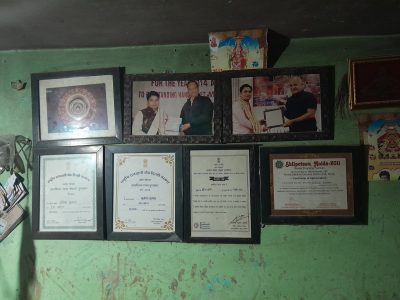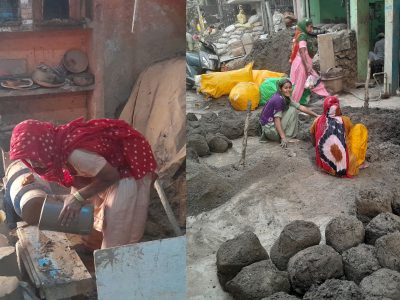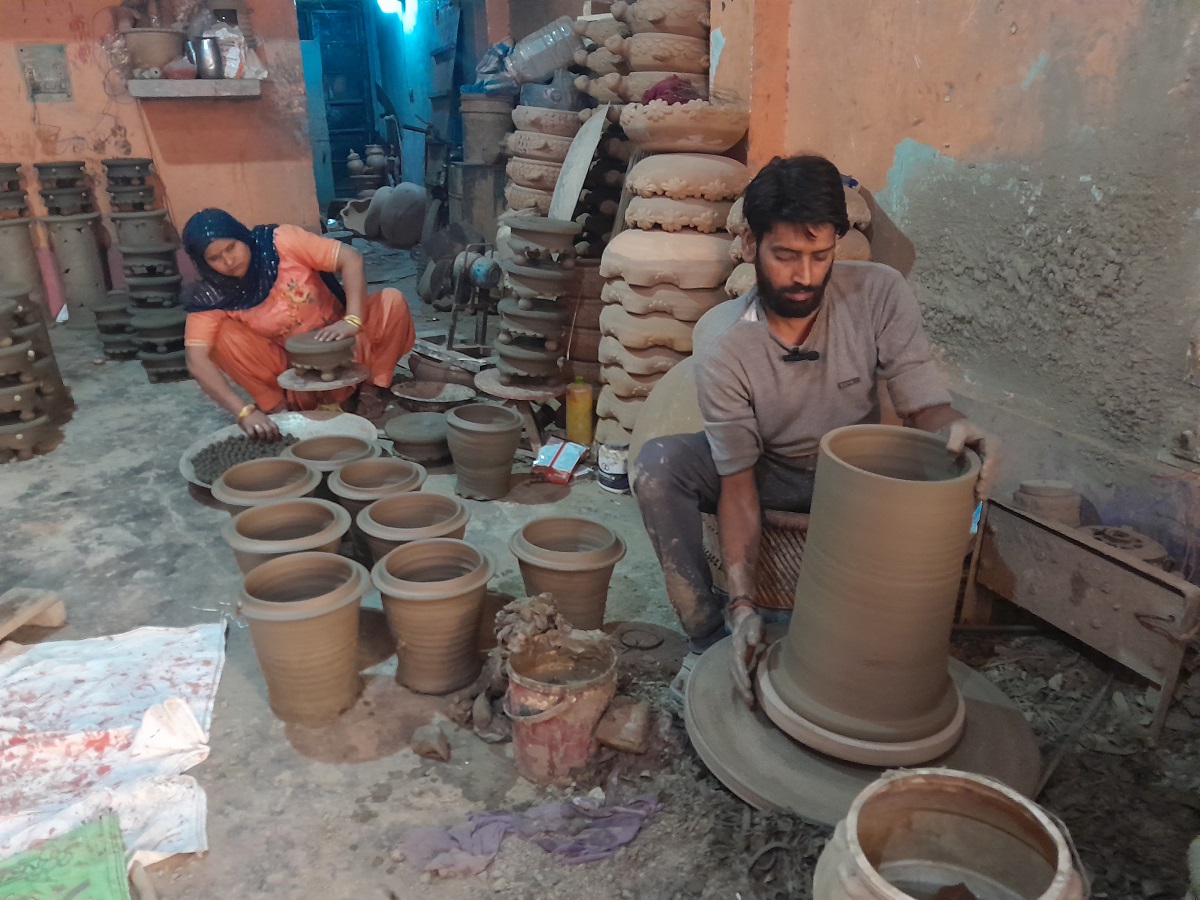Potters were once central to Diwali celebrations with their clay lamps decorating every household.
However, the National Green Tribunal (NGT)’s clampdown on furnaces within the city’s precincts, as well as fancy imports from China, have reduced their significance so much so that those working in Kumhaar Colony — colony of potters — in Uttam Nagar are looking unhappy despite Diwali being just over a week away.
“Diwali feeki si hai (Diwali is low-key for us). This work requires a lot of hard work but the returns are not good. This is our last generation working on pottery. We will not let our children continue with this,” 45-year-old Kaluram Prajapati, a resident of Kumhaar Colony, told Patriot.
Over 400 families here are involved in the making of pottery through generations.
Earthenware and clay pots, along with raw materials can be seen across the colony as people, including women and children, are engrossed in their work of making pottery.
But it seems their efforts are not getting just rewards.
“NGT came here in 2018 with the army to seal the bhatti (furnace where clay is baked). We collected Rs 2,000 from every household used that money to defend ourselves in the court. The court gave us some relief but it was not total,” said a potter to Patriot.

The NGT has warned potters about sealing their furnaces due to air pollution.
The potters feel that the government is letting them down despite emphasising on local products.
“The government talks about Make in India, being ‘vocal for local’. It wants us to use kulhad ki chai (drink tea in cup made of clay). But how will we make the cups without bhatti?” he asked, while making a flowerpot.
The potters even struggle to procure tools needed to make their products.
“From carpenter to cobbler, every craftsman’s tools are available in the market. However, we have to make tools all by ourselves since there is no market for it. Jaise-taise kaam chala rahe hain (We are just about managing).”
No marriages happening
Lack of business is also having an adverse effect on the personal lives of the potters.
The potter talks about a disturbing trend in the community, where youngsters are struggling to get married.
He says that most families of brides, even though they are into the business of making and selling pottery, don’t want the prospective grooms to work as potters.
“The families of girls often ask ‘ladka mitti ka kaam to nahi karta? (hope the boy isn’t involved in pottery work!). They even marry their girls with boys who work outside and earn Rs 10,000. But they don’t want to marry them to potters within the colony. I will also not marry my girls to potters,” said the father of two girls, who doesn’t want to be named.
He also doesn’t want his kids to follow this profession.
“Because the returns are not commensurate with the hard work put in. When we purchase raw materials, we pay cash. But retailers buy our products on credit and pay us only after Diwali. Bas do waqt ki roti nikal rahi hai. Santussti wali baat nahi hai (We are earning enough to afford two square meals a day, but there is no satisfaction).”
The colony boasts of dozens of artists of repute. However, the government does very little to promote them.
“Dozens of artists here in our colony have won national and state awards. But the government does not promote or support pottery as it should be doing,” he said.
The son of a national award-winning potter told Patriot, “It is running, but not as well as it used to.”
Karan Kumar’s family has been associated with pottery-work for half a century.
“We are just surviving,” he said with a smile.
He talked about the loophole in government’s scheme for potters.
“The benefits of the government scheme only go to the top-level potters. They don’t reach those at the bottom, who need it in reality. If the situation continues like this, it will be tough for us to sustain or run our business,” said Karan, who is involved in pottery with his entire family and sends his products across the country.
“We want to request the government to not ban our bhatti. They have already issued chalan for the pollution,” he said.
The potters also don’t want to relocate outside the city as they’ll struggle to access the markets.
Lack of customers
Even the festive season couldn’t bring in customers to the citadel of pottery. There were no customers. It wasn’t just the potters, who were sitting idle, retailers too are without any buyers.
Deepak Prajapati too was sitting idle with his uncle in their retail shop. There was not a single customer.
“Pehle jaise nahi hai (The sale this year is not like previous year),” he said.
“The prices are also low because of the rain. The manufacturing didn’t stop and people produced in large numbers. There is no good sale in the season too,” said his uncle.
Dharampal Prajapati, 38, was busy making items on his mould. His wife was also helping him and mother, sitting on a chair on the road, was dealing with customers outside the gate.
He is satisfied but accepts the recession in the market. Things have started to look up a bit after ban on Chinese goods, but returns remain unsatisfactory.
“Sales are picking but slowly. I am making products on order. After the ban on Chinese products, the demand has increased. Chinese products had killed our market.”
The demand of pots made of earthenware also increased because the doctors advised to use the clay products.

Dharampal, who hails from Haryana’s Mewat region, has dedicated three decades to his ancestors’ terracotta business. But he doesn’t want his children to continue with this.
“Our children help us but only during the festive season. They don’t want to take it up permanently. They feel that it requires a lot of hard work and gives less profit,” said Dharampal.
Kaluram, who was also making pottery with his wife and his brother, has been working on this for decades but is not happy with the condition of business.
“There is a lot of competition. The price of raw materials is also soaring. Items made of chini-mitti (ceramic) are replacing ours. So, we will not hand it over to children and are instead educating them,” said the father of two. Both his children are doing B.Ed after graduation.





